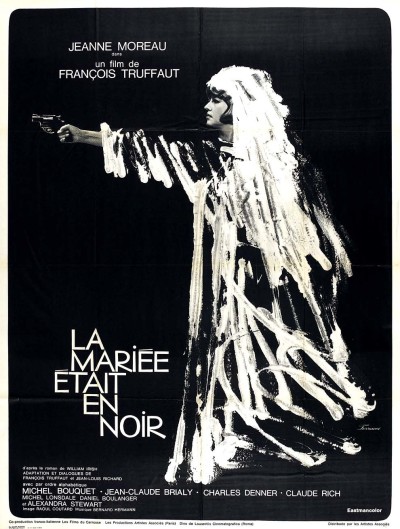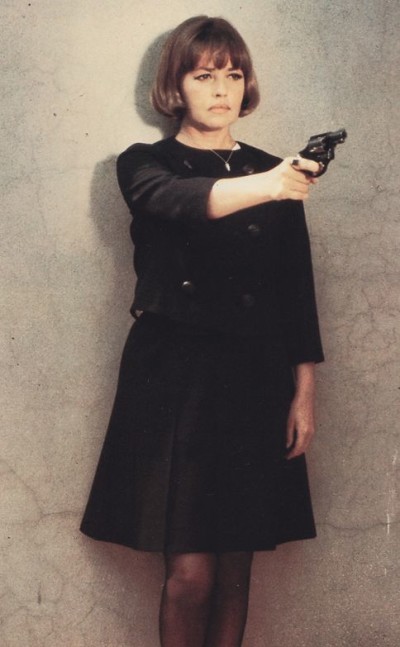★★★★
“I’ve got a little list, of society offenders who might well be underground,”
“No remorse, no fear… The justice of men is powerless. It can’t punish me. I’m already dead.
I died the same day David did. I’ll join him after I’ve had my revenge.”

 Undeniably highly influential, this 1968 French film starts with a woman, Julie Kohler (Moreau) trying to commit suicide. Stopped by her mother, she begins her mission: to track down the five men who were, to some extent accidentally, responsible for gunning down her husband, literally outside the church where they had just got married. She jets around the country, taking care of them, and crossing their names off a list in her notebook. Sound familiar at all? Yes, this is another one of the sources which Quentin Tarantino
Undeniably highly influential, this 1968 French film starts with a woman, Julie Kohler (Moreau) trying to commit suicide. Stopped by her mother, she begins her mission: to track down the five men who were, to some extent accidentally, responsible for gunning down her husband, literally outside the church where they had just got married. She jets around the country, taking care of them, and crossing their names off a list in her notebook. Sound familiar at all? Yes, this is another one of the sources which Quentin Tarantino shamelessly ripped off was inspired by for Kill Bill, though obviously Kohler is nowhere near such a sword-swinging badass as The Bride, opting mostly for less arterial techniques. Tarantino says he never saw it, but for a devoted film fan who worked in a cult video store, that’s about as credible as his claim not to have seen City on Fire before making Reservoir Dogs. It also inspired, as documented elsewhere, the Kate Bush song The Wedding List, in which a widow seeks revenge for those who slew her husband.
Truffaut had just finished a lengthy set of interviews with Alfred Hitchcock, and you can see the influence here, not least in the score by frequent Hitchcock collaborator, Bernard Hermann, which riffs on the Bridal March to positive effect. Though the director spent so much time on set here arguing with his cinematographer, that Moreau ended up directing the actors for significant chunks. Truffaut expressed disappointment at the time of its release, and the critical response was underwhelming, but it was a commercial success and its reputation has grown over time. You can see why, with Moreau holding the episodic nature of the film together well, gluing the segments together devoted to each victim. She may not be able to overpower them physically, and the film works within that admirably, using her smarts and guile as a weapon, to reel them in and put them in a position where they are vulnerable. Her first victim is an excellent example, as she flirts with the man and eventually gets him to climb over a high balcony to retrieve her scarf. One little push, and she gets to cross a name off her list.
 This intelligence holds throughout the entire movie. At first, it seems a fatal mistake when she leaves behind a bit of evidence at the scene of a crime, and worse still when she then attends the funeral of the victim, where she is arrested by the police. However, this leads to a glorious moment of realization for the viewer, when you figure out that it is all part of her meticulously-crafted plan. The last shot of the movie follows that to its logical conclusion [well, logical if you accept that, in sixties France, men and women could be held in the same prison; hey, it’s France!], in an entirely satisfying way. Its inevitability is part of its charm, because the viewer and the heroine know what’s about to happen, while everyone else is ignorant. In effect, you become Julie’s accomplice at the end, and it works brilliantly.
This intelligence holds throughout the entire movie. At first, it seems a fatal mistake when she leaves behind a bit of evidence at the scene of a crime, and worse still when she then attends the funeral of the victim, where she is arrested by the police. However, this leads to a glorious moment of realization for the viewer, when you figure out that it is all part of her meticulously-crafted plan. The last shot of the movie follows that to its logical conclusion [well, logical if you accept that, in sixties France, men and women could be held in the same prison; hey, it’s France!], in an entirely satisfying way. Its inevitability is part of its charm, because the viewer and the heroine know what’s about to happen, while everyone else is ignorant. In effect, you become Julie’s accomplice at the end, and it works brilliantly.
It’s an interesting choice to make her targets not evil or even particularly malicious; careless, is probably closer to the truth, and the cost of that carelessness is, arguably, far in excess of what it deserves. This gives the film a moral ambiguity that’s the complete opposite of Kill Bill, where the rest of the DIVAS were set up as utterly deserving of the Bride’s vengeful fury. This almost absurdist balance seems typically French, as does the heroine’s remorseless quest for payback; both aspects are reminiscent of Jean de Florette/Manon des Sources, albeit clearly without those two films’ pastoral setting and tone. The film is based on a 1940 novel by American noir author Cornell Woolrich, though some imprints have it published under Woolrich’s pseudonym, William Irish. The novel opens with a quote by Guy de Maupassant: “For to kill is the great law set by nature in the heart of existence! There is nothing more beautiful and honorable than killing!”, and this is an apt summary of what follows.
It wasn’t Truffaut, but another cornerstone of the French new wave, Jean-Luc Godard, who supposedly said “All you need for a movie is a gun and a girl” [though indications are, he was quoting D.W. Griffith]. While Godard certain included the combination often enough in his own work, it’s from Truffaut we get a more fully-fledged exploration of the theme, even if Julie barely touches an actual gun over the course of the film – it’s understandable, given the nature of her husband’s death, that she would adopt other approaches. This manages to be as much a satire of, as a loving homage to, both Hitchcock and the tropes of the “vengeful woman” genre, though plays it dead straight, so can be appreciated and enjoyed purely on its own merits. If certainly not lacking in style, Truffaut – and, perhaps more importantly, Moreau – also manage to deliver the substance, and almost fifty years later, this stands the test of time with rare persistence.
Dir: François Truffaut
Star: Jeanne Moreau, Jean-Claude Brialy, Michel Bouquet, Charles Denner
[a.k.a. La Mariée était en noir]















